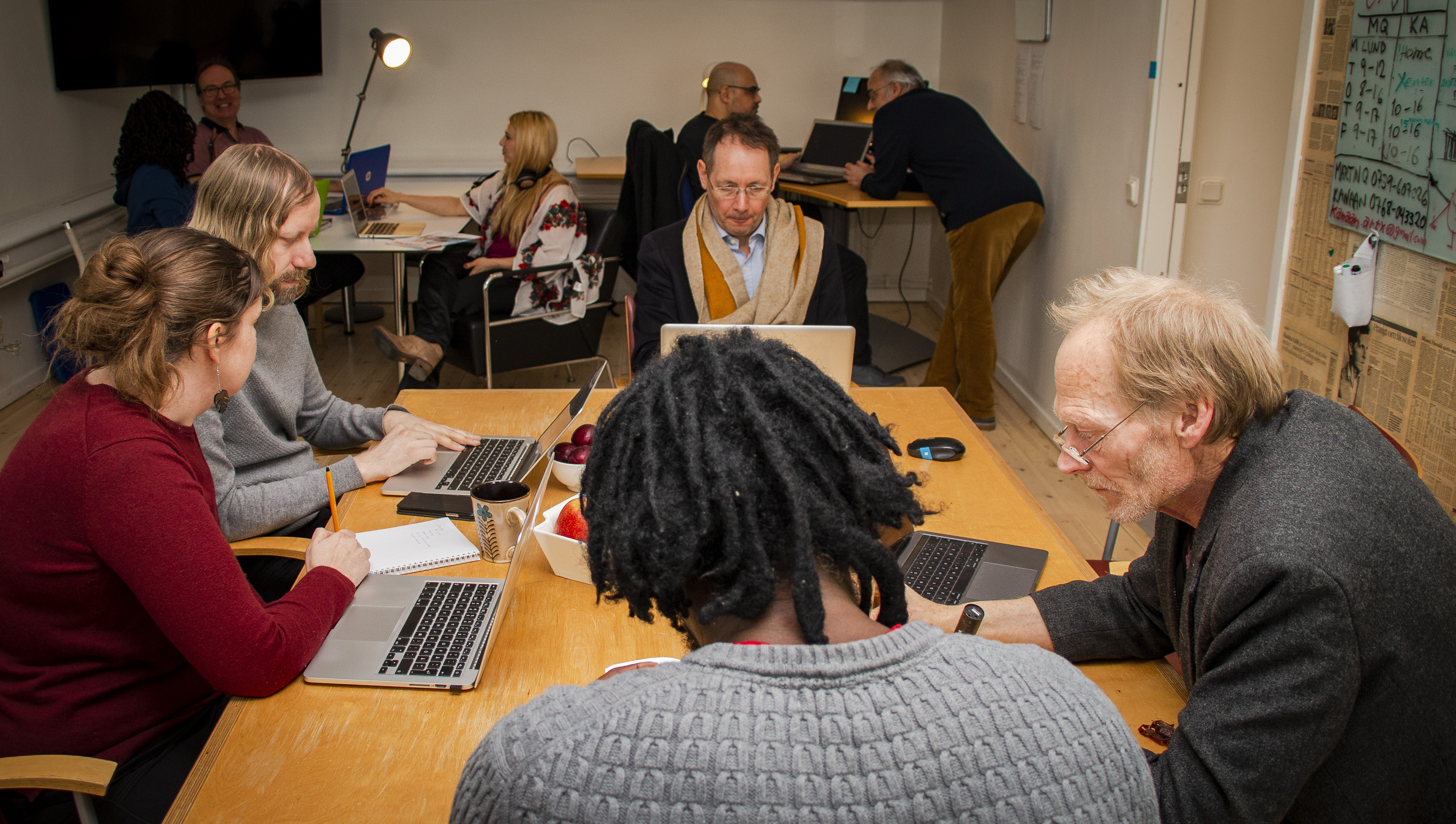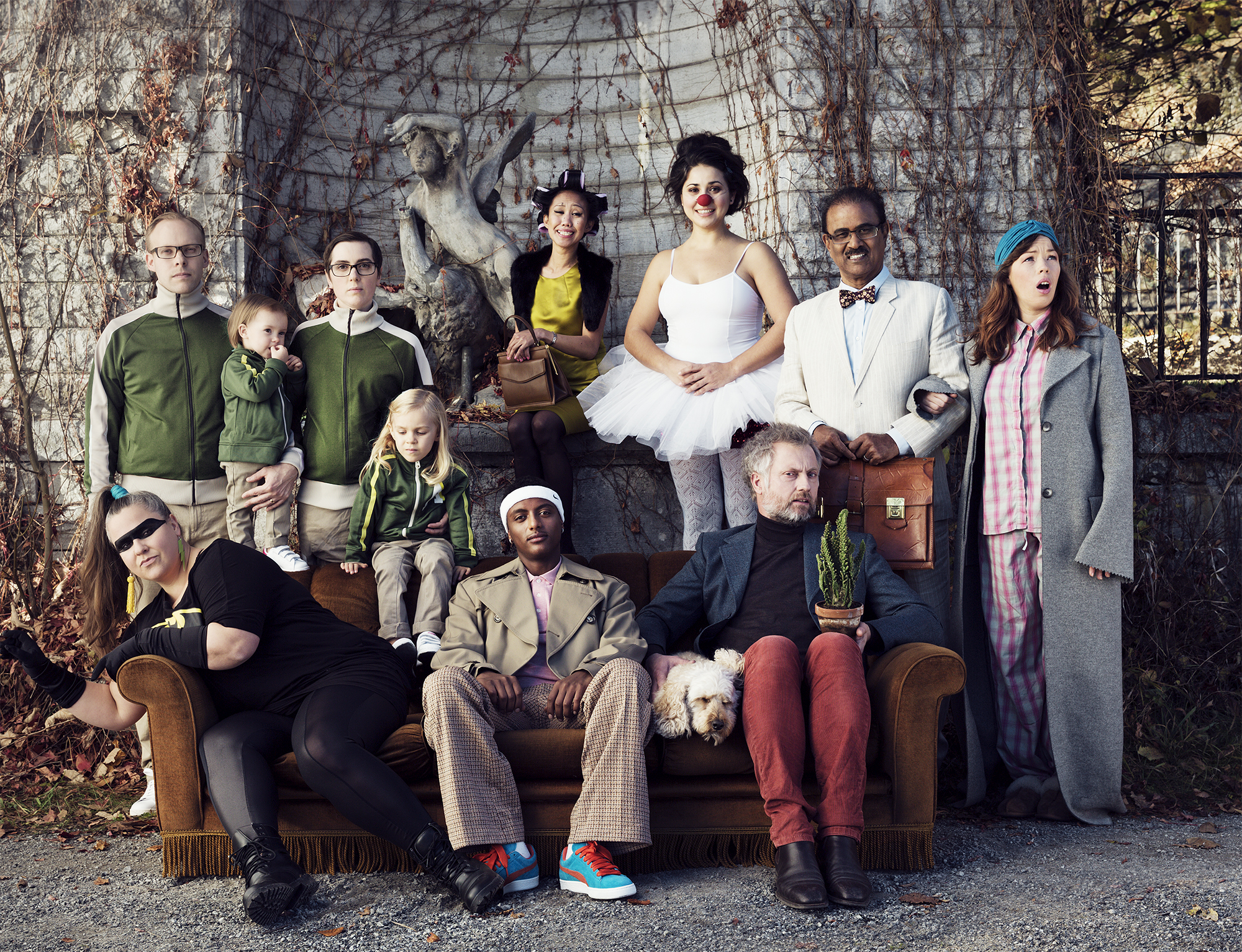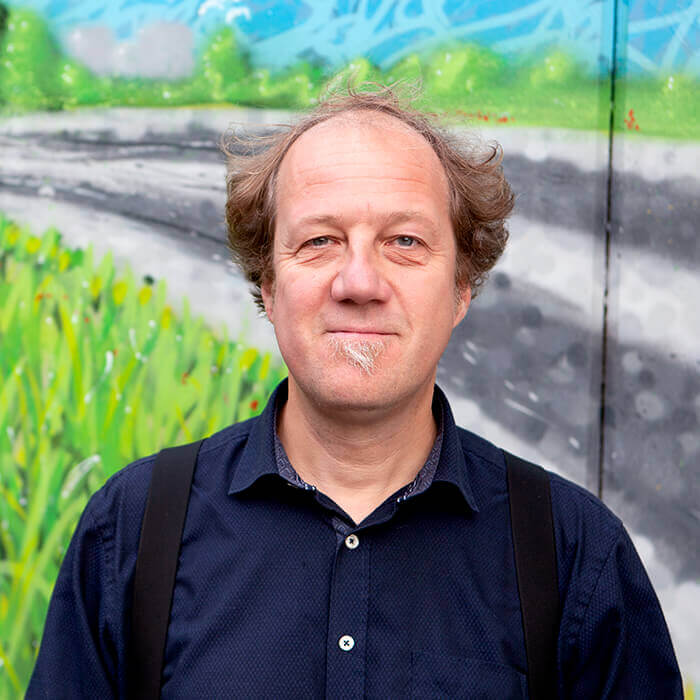Katapult is Subtopia’s creative incubator and workspace for creative startups in cultural, social and creative industries. They help entrepreneurs develop their visions into sustainable businesses by offering creative coaching, an affirming environment, a flexible office, plus everything else that comes with being neighbours with all the companies in and around Subtopia. Currently, Subtopia focuses a lot on cross innovation – using tools and methods from the art field in other sectors of society – as well as the making of temporary teams through the tool Team Generator.
The hub’s history
This is a municipally started initiative. Botkyrka is one of the municipalities surrounding Stockholm around 20 kilometres south of the city centre. Botkyrka has a very high grade of immigrants and in northern Botkyrka about 95% of the population was either born abroad or have two parents born abroad. We have this great diversity and there's so many possibilities. In 2002, the founders started a new Culture House called Kulturhuset Rotemannen, later renamed as Subtopia.
We celebrated our 20th anniversary this autumn and it was a sort of take-off ramp for miraculous ideas, lots of artists, especially circus artists, since we have a big circus company next to us. Those social initiatives started here.
We wanted to give the members of Katapult the necessary resources and skills before we throw them out in society where they will have much more movement to what we do.
In 2011, we decided to start a creative incubator, with a small grant from the Business Department of the municipality, to foster development of new creative entrepreneurs of different kinds. We celebrated 11 years last week. Since I was hired, I've developed the foundation much further. The reason this started is to provide the possibility for first and foremost Botkyrka citizens, fulfil their dreams, in a structured way, within the cultural and creative sector, social entrepreneurship and make long term sustainable businesses out of their artistic ideas.
Today we have approximately 48 people in 38 startups who are developing their ideas here. We are a low threshold incubator, so you don't need to have a special degree or a special turnover in order to join us. Some people have a vague idea of what they want to do. Some people have a limited company that they run for 10 years and want to make a new development. It varies. We have people from 24 to 66 years old. We also have all kinds of artists and social entrepreneurs and a very flexible system. You can start or stop, more or less any time. Some people are here for three hours, some others for three years. It's up to you what you want to do over this time. It can be lonely being a single entrepreneur so after almost one year of preparations, we changed this by creating Katapult.
Instead of just hanging around and being cool, we wanted to give the members of Katapult the necessary resources and skills before we throw them out in society where they will have much more movement to what we do. I think we have had approximately 450 people since the start.
Why did you choose to base your hub in this area?
At the Subtopia cultural centre, as a cultural production place with cultural clusters, we are about 25 companies joining forces and our relation to them is basically that we are their landlords, they pay rent to us and we pay this rent to the municipality. Then we started on an experimental basis to coach these entrepreneurs who came here, because they were often very good artists, but just as often lousy entrepreneurs. They were good at making art and less good at making money.
We help people and every day try to find the next natural step for them to take.
There was actually a project that I was vaguely involved in called the Red Line, because the subway closest to Subtopia is called the red line. The subway goes through a lot of education and cultural places and the programme aimed to fuse them together. Then we did some coaching and slowly it started to become more structured. I think we still have an important mission to fulfil. But most of all, Subtopia started because we want to be a maker of possibilities for new endeavours. I also think it is important to get support from the Business Department of the municipality rather than the Culture Department.
There are three other incubators in the Stockholm area, and they all get their funding from the cultural side of society. Even though it is very late, we finally have this big movement and an investigation on creative businesses last year and so things are moving.
What did you manage to (re)build in your territory?
I think we built a sense that it's okay to earn a living from art. I didn't introduce myself, I'm actually trained as a classical composer. When I graduated from the Conservatory College in Stockholm in 1997, I knew everything about how to compose music, but I knew nothing about how to survive on composing music. So, I had to learn everything myself. I was a freelance composer and musician, project and workshop manager, bus driver and kindergarten worker, all these kinds of weird things you do! I mainly survived by inventing weird projects in contemporary art and managed to finance them. I did that for 25 years and then got very much involved in cultural policy. I was in the leadership of many art organisations, both in Sweden and Europe, and learned how things work from the government perspective.
We decided to start an organisation called CreARTive to organise the creative incubators of Sweden.
Then in 2017, I managed to trick someone else to take over after me and ventured to this work that I have today. Still, my first steady work ever. I could also say, at least in Sweden, when I started this cultural policy thing in 2010, it was still seen as a little problematic if you made money from your art. Unless you are rich from the start, you must make money from somewhere. Why not art instead of driving a bus or working in kindergarten? It's better to work while making music and I think that change of perception, depending on your view of your profession, has been very important. I definitely think that Katapult has been playing a big role in doing this on the grassroots level. We help them and every day try to find the next natural step for them to take. My predecessor has been part of many festivals and many of them he created himself, but myself I have basically done three things. Two years ago, we had our anniversary. Instead of having an open house, we had 10 lunch webinars. We were talking about 10 different aspects of creative business.
When I started as a creative hub manager here, I had been on the board for creative business, so I knew exactly what a creative hub does and should be doing. But I didn't have a clue on what to do on a day-to-day business. I solved that by duelling up some of my colleagues, visiting them around Sweden, stole a lot of their best ideas and used it for myself or realised that I'm not gonna do that anyway. I learned very much from them and also from getting to know these people who were doing things differently, but we all had the same purpose. Then the next natural step was to invite them to Subtopia where we quickly found out that we have different methods, organisations, funding and staffing. But we all work with exactly the same purpose, helping creatives to make a living in a better way. We decided to start an organisation called CreARTive to organise the creative incubators of Sweden.
It's very difficult for corporations and artists to work together, but it's very easy for people to work together.
Today, we have 12 members from all over Sweden. As far as we know, we are the only national creative incubator organisation in the world. The third thing is that when CreARTive was just one month old, I went to a networking meeting in Helsinki and together we formed the Nordic-Baltic Creative Industries Incubator network. We have monthly meetings, very ambitious networking programmes, some funding from the Nordic funding and did a very ambitious programme in the middle of the pandemic. Nowadays, we meet about monthly to just chat and talk about what we're doing and exchange tips and ideas.
Projects
We have two exciting projects currently running. It's basically a course because it comes from regional funding and it's for solo and micro entrepreneurs from all kinds of sectors, living in the Stockholm region. They learn how to become better at collaboration. Usually, people collaborate with people they already know because they know how they work.
Our method says that it's very powerful if you can collaborate with everyone. These people are learning some basic tools for team building and how to be a better collaborator. And it's totally digital. We want to scale it up after this project and make something better of it. We also work a lot with cross innovation. We define cross innovation by using tools and methods from the artistic practices in other fields of society other than culture. We have done two rounds of a programme called Learning Labs Cross Innovation, where we have a sort of matchmaking programme between artists and corporations. It's very difficult for corporations and artists to work together, but it's very easy for people to work together.
We are talking about how you can work together in theory, some do this in practice as well. We did one round with just Swedish companies and corporations and then we did one round with Swedish and Lithuanian artists and corporates and ended this with an International Conference in hybrid format, in Vilnius, Lithuania.
How do you envision the future?
We want to think from the creative side. It's important to stress what creative incubators are and can be. Traditionally, creative incubators are seen as training centres for emerging entrepreneurs. All of us still are but we have also in the last few years started to be a breeding ground for new ideas in general in this field. Because we have knowledge of business and we have knowledge of art, we can have the trust from both sides. We can be a neutral playground, a place to invite artists and corporations, help them start working together and become translators and build bridges for them. As I see it, there's a wide array of how creative incubators work, or can work.
We have also engaged a lot in the famous KIC project, which is aiming to boost the creative incubators of Europe or to start new ones and we are very much looking forward to that. The new things we are doing will be in the scope of the KIC, but we are also venturing much right now into cross innovation and to build better networks in the Nordic and Baltic region. We are applying for funding for bootcamps around the Baltic Sea. It's important to mix cultures and people with each other.
 Spotlight Practice 1: Cross-innovation
Spotlight Practice 1: Cross-innovation
We focus a lot on cross innovation. It is a little difficult to find corporations, but when you find these people, who are interested, they are much more enthusiastic than the artists about art and working with artists. One project we are doing, in cross innovation together with Latvia and Poland, is called creative insight. Basically we are going to build two cases across innovation works, plant two artists in two commercial companies and let them work there for a month or two with specific challenges set up by the companies. Then they will do an evaluation of the effects, with an evaluation tool on how to do this properly and present it in another conference in Subtopia.
 Spotlight Practice 2: Team Generator
Spotlight Practice 2: Team Generator
The Team Generator is an education programme for entrepreneurs who want to become better at collaborating. It is based on participants from our recent open call. We put all members in temporary teams of 4-5 people each. The idea was to use each other’s competences and also in the course of this programme there are a number of exercises you can do, in order to practise. All groups are beginners, so it is a good opportunity to practice. The groups can research together and learn from each other and start collaborating more. Every second week everyone meets for a common checkpoint and some actual teaching of ideas and concepts for half a day online and every other week each group meets just among themselves. This is the third time we are doing this. The first time we made some mistakes, which we corrected for the second time, now we are doing it for the first time in English, whereas so far, we did it in Swedish. We have found a format that could work.

Photo by Luka Garuski. Martin Q Larsson, Incubator Manager of Katapult. During our interview, he explained how Katapult is trying to bridge the gap between artists and the business world, in a cross-pollination journey that is uniting incubators from all over the Baltic region.